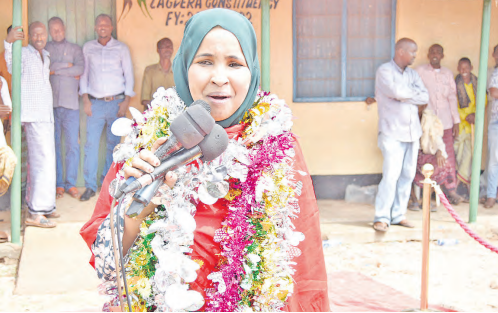
EXPLAINER: What to know about 16 Days of Activism against GBV
The campaign runs annually from November 25 to December 10
FGM, defilement, rape, early marriage and femicide are some of the vices that continue to be reported.
In Summary

Leaders and activists in Garissa are now calling for more involvement of men in the fight against gender-based violence.
Female genital mutilation, defilement, rape, early marriage and femicide are some of the vices that continue to be reported.
Speaking at Afuweyne Primary School, Baraki ward, Lagdera subcounty, during the launch of 16 Days of Activism against GBV 2024, speakers cited men as the weakest link in the fight to end the vice, even as they called for more inclusion.
Garissa Woman Representative Udgoon Siyad said that for the fight to succeed, it was important that men are brought on board.
She reiterated the important role men play in ending GBV. “When you look at all these retrogressive cultural practices, our male counterparts are always at the centre. And so even as we speak of ending them we must first start by engaging them directly on the need to protect our young girls and women,” she said.
“When you go back to Maslah, it is the same men who have unfortunately abused the system by using it to resolve these cases that should go to court. So when we talk about engaging men more in our campaigns it makes a lot of sense.”
Maslah is a form of alternative justice resolution system commonly used by pastoralists to resolve conflicts. She promised to bring an anti-Maslah bill in Parliament that would ensure that the system is not abused.
She further challenged the stakeholders not to focus all their energies and attention on the protecting the girl child while forgetting boys and men who, she said, are also under threat.
“We have all seen a rise of cases of sodomy in Garissa Township, something that was unheard of in our society, together we must join hands and fight these crooks whose sole intention is ruining the lives of our boys.”
On her part, Garissa gender executive Hawa Sahal said that it was the responsibility of everyone to fight the vices of sodomy and GBV.
"To our dear men, you have a big role to play in ending GBV by either reporting to the relevant authorities when you see these things happening or by making sure that you are not part and parcel of those involved,” she said.
Abdiwahab Ibrahim, NEP regional coordinator for the National Gender and Equality Commission said that while the agency was committed in promoting gender equality and ensuring that the rights of all citizens are upheld, men have a big role to play.
He said that in the last three months alone, seven cases of defilement have been reported in Afuweyne location, adding that the trend was worrying.
He called on the political leadership to continue pushing for laws that will see those involved in GBV cases subjected to tough penalties.
Moses Ouma, Northeastern regional population coordinator said that the high FGM prevalence rate, which stands at 83 per cent in Garissa, is a driver to teenage motherhood, early marriages and high school dropouts.
According to the Kenya Demographic Health survey 2022, 83 in every 100 women and girls in Garissa county have undergone circumcision.
The survey further reveals that girls aged between 15 and 19 are either pregnant or already mothers. “FGM is a major challenge because it is leading to increased poverty, illiteracy, maternal mortality as well as high infant mortality in the county,” Ouma said.
He added that the situation is even worse in remote counties like Wajir and Mandera, where out of 100 women, 97 have gone through FGM.
The 16 Days of Activism against
GBV is an annual international civil
society-led campaign.

The campaign runs annually from November 25 to December 10

Nearly one in three women experience violence in their lifetime.

Athletes Agnes Tirop, Rebecca Cheptegei and Damaris Muthee among women killed.